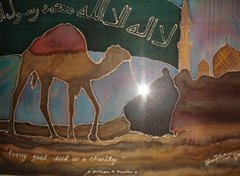
IN-51
The excellence of remembering Allah
Allah's Messenger (SAW) said: Whoever says:
Subhaanallaahi wa bihamdihi.
Glorified is Allah and praised is He.
one hundred times a day, will have his sins forgiven even if they are like the foam of the sea.
Reference: Al-Bukhari 7/168, Muslim 4/2071, see also invocation no. 91 of this book.
Allah's Messenger (SAW) said: Whoever says:
Laa 'ilaaha 'illallaahu wahdahu laa shareeka lahu, lahul-mulku wa lahul-hamdu wa Huwa 'alaa kulli shay'in Qadeer.
None has the right to be worshipped but Allah alone, Who has no partner. His is the dominion and His is the praise, and He is Able to do all things.
ten times, will have the reward for freeing four slaves from the Children of Isma'il.
Reference: Al-Bukhari 7/67, Muslim 4/2071, see also invocation no. 93 of this book.
Allah's Messenger (SAW) said: Two words are light on the tongue, weigh heavily in the balance, and are loved by the Most Merciful One:
Subhaanal-laahi wa bihamdihi, Subhaanal-laahil-'Adheem.
Glorified is Allah and praised is He , Glorified is Allah the Most Great.
Reference: Al-Bukhari 7/168, Muslim 4/2072.
Allah's Messenger (SAW) said: For me to say:
Subhaanallaahi, walhamdu lillaahi, wa laa 'ilaaha 'illallaahu, wallaahu 'Akbar.
Glory is to Allah, and praise is to Allah, and there is none worthy of worship but Allah, and Allah is the Most Great.
is dearer to me than all that the sun rises upon (i.e. the whole world).
Reference: Muslim 4/2072.
Allah's Messenger (SAW) said:
"Is anyone of you incapable of earning one thousand Hasanah (rewards) in a day?" Someone from his gathering asked, "How can anyone of us earn a thousand Hasanah':'" He said, "Glorify Allah a hundred times and a thousand Hasanah will be written for you, or a thousand sins will be wiped away."
Reference: Muslim 4/2073.
Whoever says:
Subhaanallaahil-'Adheemi wa bihamdihi.
Glorified is Allah the Most Great and praised is He.
will have a date palm planted for him in Paradise.
Reference: At-Tirmithi 5/511, and Al-Hakim who graded it authentic and Ath-Thahabi agreed 1/501. See also Al-Albani, Sahihul-Jami' As-Saghir 5/531 and Sahih At-Tirmithi3/160.
Allah's Messenger (SAW) said: "O Abdullah bin Qais, should I not point you to one of the treasures of Paradise?" I said, "Yes, O Messenger of Allah." So he told me to say:
Laa hawla wa laa quwwata 'illaa billaah.
There is no power and no might except by Allah.
Reference: Al-Bukhari, cf. Al-Asqalani, Fathul-Bari 11/213, Muslim 4/2076.
Allah's Messenger (SAW) said: The most beloved words to Allah are four:
Subhaanallaah, Walhamdu lillaah, Wa laa 'ilaaha 'illallaah and Wallaahu 'Akbar.
Glorified is Allah, The praise is for Allah, There is none worthy of worship but Allah, Allah is the Most Great
Reference: Muslim 3/1685.
A desert Arab came to Allah's Messenger (SAW) and said, "Teach me a word that I can say. " The Prophet told him to say:
Laa 'ilaaha 'illallaahu wahdahu laa shareeka lahu, Allaahu 'Akbaru kabeeran, walhamdu lillaahi katheeran, Subhaanallaahi Rabbil-'aalameen, laa hawla wa laa quwwata 'illaa biilaahil-'Azeezil-Hakeem.
There is none worthy of worship but Allah , Who has no partner, Allah is the Great, the Most Great, and praise is to Allah in abundance, glory is to Allah, Lord of the worlds . There is no power and no might but by Allah the Mighty, the Wise.
He said, "That is for my Lord, but what about me?" The Prophet (SAW) told him to say:
Allaahummaghfir lee, warhamnee, wahdinee warzuqnee
O Allah forgive me, and have mercy on me and guide me, and provide for me.
Reference: Muslim 4/2072, Abu Dawud reports the same Hadith with the addition: and when the Arab left, the Prophet (SAW) said: "He has filled his hands with goodness." 1/220.
Whenever anyone accepted Islam, the Prophet (SAW) used to teach him how to pray then he would instruct him to invoke Allah with the following words:
Allaahummaghfir lee, warhamnee, wahdinee, wa 'aafinee warzuqnee.
O Allah forgive me, and have mercy on me and guide me and give me good health and provide for me.
Reference: Muslim 4/2073, and in one of Muslim's reports there is the addition: 'For these words combine [the goodness of] this world and the next.'
The most excellent invocation is:
Alhamdu lillaah.
Praise is for Allah.
Laa'ilaaha'illallaah.
There is none worthy of worship but Allah.
Reference: At-Tirmithi 5/462, Ibn Majah 2/1249, and Al-Hakim who graded it authentic and Ath-Tbahabi agreed 1/503. See Al-Albani, Sahihul-Jami' As-Saghir 1/362.
The good deeds which endure are:
Subhaanallaah, Walhamdu lillaah, Wa laa 'ilaaha 'illallaah, Wallaahu 'Akbar and Wa laa hawla wa laa quwwata 'illaa billaah
Glorified is Allah, The praise is for Allah, There is none worth of worship but Allah, Allah is the Most Great and There is no power and no might except by Allah
Reference: Ahmad (no. 513) (Ahmad Shakir, ed.) and its chain of narration is authentic. See Majma'uz-Zawa'id 1/297. Ibn Hajar mentions it in Bulughul-Maram saying that Ibn Hibban and Al-Hakim considered it authentic
How the Prophet (SAW), glorified Allah
Abdullah bin 'Amr (RA) said: "I saw the Prophet (SAW) counting the glorification of his Lord on his right hand."
Reference: Abu Dawud with a different wording 2/81, and At-Tirmithi 5/521. See also Al-Albani, Sahihul-Jami'As-Saghir 4/271 (no. 4865).
Types of goodness and good etiquette for community life
When evening descends, bring your children indoors for the devils scatter out at this hour. Then after the passing of an hour (i.e. the first hour) of the night, (you may) let them (the children) go. Close your doors while mentioning the Name of Allah, for the devil may not open a closed door. Fasten your waterskins mentioning the Name of Allah. Cover your eating vessels mentioning the Name of Allah even if you just put something over it, and extinguish your lamps.
Reference: Al-Bukhari, cf. Al-Asqalani, Fathul-Bari 10/88, Muslim 3/1595.











